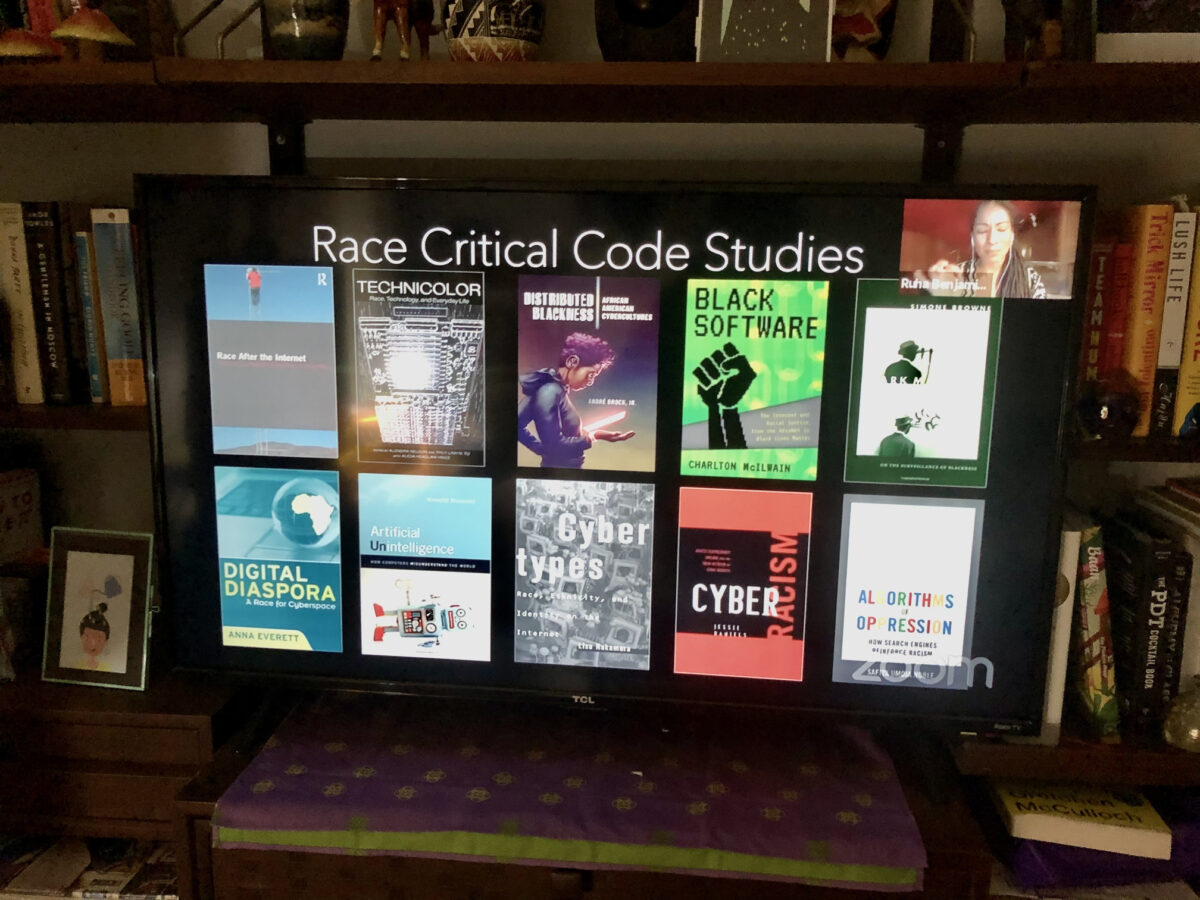I recently watched two talks from Ruha Benjamin. I learned about her work from an episode of the Cite Black Women podcast – here is the episode on Apple and on SoundCloud.
I first watched her author talk for the San Francisco public library from 2020 and then her talk for Data & Society from 2019. Both have some of the same content, and some different content. The Data & Society recording has closed captioning and her lecture is 20 minutes at the beginning, the library talk is longer and does not have closed captioning, but it does have more detail and is more for a general audience.
This post contains links to a reading list she recommends, and a quote from her answer to one of the questions that gave me pause.
Race Critical Code Studies Reading List
There was a slide from her presentation for SF Library that had a reading list for “Race Critical Code Studies”, or critical race theory in code and technology. I thought I’d type up the books and research the links for future reference.
Ruha’s books:
- Race After Technology
- Captivating Technology: Race, Carceral Technoscience, and Liberatory Imagination in Everyday Life
Books by others (with some additional links to podcasts with the authors that I found and have not yet listened to):
- Black Software: The Internet & Racial Justice, from the AfroNet to Black Lives Matter by Charles McIlwain
- Podcast episode with the author: The Black Engineers Who Opened Up The Computer Revolution
- Algorithms of Oppression: How Search Engines Reinforce Racism by Safia Noble
- Podcast episode with the author: The Algorithm of Oppression on the Karen Hunter Show
- Artificial Unintelligence: How Computers Misunderstand the World by Meredith Broussard
- Podcast episode with the author: Artificial Unintelligence on the Cognitive Bias Podcast
- Distributed Blackness: African American Cybercultures by André Brock
- Podcast episode with the author: Dr. André Brock, Jr “Distributed Blackness”
- TechniColor: Race, Technology, and Everyday Life edited by Alondra Nelson, Thuy Linh Nguyen Tu and Alicia Headlam Hines
- Podcast episode with Alondra Nelson: Episode 4: Race, Identity, Reparations, and the Role of Ancestral DNA Testing ft. Alondra Nelson
- Podcast episode with Thuy Linh Nguyen Tu: Asian Fashion
- Cybertypes: Race, Ethnicity, and Identity on the Internet by Lisa Nakamura
- Podcast episode with the author: Lisa Nakamura, “Race, Rights, and Virtual Worlds: Digital Games as Spaces of Labor Migration”
- Cyber Racism: White Supremacy Online and the New Attack on Civil Rights by Magdalena Wojcieszak
- Podcast episode with the author: Magdalena Wojcieszak on Media Exposure and Political Polarization
- Dark Matters: On the Surveillance of Blackness by Simone Brown
- Podcast episode with the author: Imagine Otherwise: Simone Browne on the History of Anti-Black Surveillance
- Race After the Internet edited by Lisa Nakamura and Peter-Chow White
- Digital Diaspora: A Race for Cyberspace by Anna Everett
A few additional resources:
- Advancing Racial Literacy in Tech (free PDF) by Jessie Daniels, Mutale Nkonde, Darakhshan Mir
- Digital Defense Playbook: Community Power Tools for Reclaiming Data by Our Data Bodies (also available as free PDF, a web search will reveal)
- White Collar Crime Risk Zones, machine learning to predict where financial crimes across are most likely to occur. This machine learning ends up doing the reverse profiling that we see from many – the profile of a suspect is a white man.
Check out Ruha’s website here and if you use Twitter, you can follow her here.
Something that gave me pause
I also want to write about a couple of things that particularly gave me pause during the Q&As in the author talk linked above.
First, was Ruha’s answer to a question at the end of the library talk, “How much does it help to have racially diverse teams building technology?”. She answers that while diverse teams are necessary, they are not sufficient to address the wider scope of discriminatory design of products:
Diversity of teams is not a panacea; it’s not going to work like magic fairy dust if the culture of organizations doesn’t change and also the larger ecosystem in which technologists and technologies companies operate.
[…]
Diversity can’t be our end-all be-all because power can still continue to operate in very harmful and violent ways within a diverse workforce.
Ruha Benjamin at SF Public Library Author Speaker Series
Ruha then gives a powerful example of this at work, and you can listen to it here – it’s only about five minutes and I found it to be quite eye-opening.
